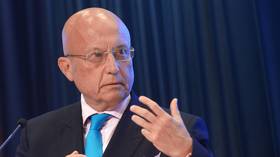A ‘New Cold War’ has already started, but Russia & China are winning against a ‘weakening’ West, says former Kremlin adviser

The Soviet Union might have lost the first Cold War, but Russia is ahead in the rematch with the US and, this time, has every chance of coming out on top. That's according to one well-known Moscow scholar, Sergey Karaganov.
Speaking to Russian newspaper Argumenty I Fakty, the academic argued that Moscow is now much stronger than it was during the late Soviet period, and the West has weakened in that time.
Karaganov has been one of Russia’s top foreign-policy theorists for decades, and has also advised President Vladimir Putin in the past. He is currently the head of the World Economy and International Affairs faculty at the Higher School of Economics (HSE), a prestigious university in Moscow. He is also well-known for the eponymous ‘Karaganov doctrine,’ which states that Moscow should act as a defender of human rights for ethnic Russians living in the near abroad.
Also on rt.com By acknowledging America can’t stop the pipeline, Biden's Nord Stream 2 deal seals the end of the Washington-centric world order“There are several factors that allow us to talk about good chances for success,” the professor explained.
Firstly, he claims, during the Cold War, the Soviet Union was concerned with enemies on more than one front. Now, with Beijing on the side of Moscow, Russia can utilize China as a strategic resource, he went on to say. Secondly, the country is much more prosperous than it was during the latter years of the USSR. And most importantly, the West is significantly less powerful than it was in the past.
“But, to win even against a weakening but still powerful West, we need to pursue the right policies, both at home and abroad,” Karaganov warned.
He also pointed to the “burdens” of the Soviet Union that don’t apply to Russia, such as what he described as Moscow’s need to feed half of the world despite local food shortages, as a benefit in its current situation. He sees the lack of dependent client states as an advantage in Russia's current situation.
Also on rt.com Washington Post's branding of Russians & Chinese as 'uncivilized' betrays the latent xenophobia fueling America's New Cold War“Georgia received the most money per capita in the USSR, and Ukraine received the most money in absolute terms,” he explained. “It is no coincidence that, with the loss of these subsidies, all of them became dramatically poorer.”
When it comes to China, Karaganov dubs the relationship a “semi-alliance,” noting that it came about due to the West’s geostrategic failures. However, the political scientist warned against “selling the country’s sovereignty” to Beijing, repeating the mistakes of Europe’s close friendship with Washington in the past.
Karaganov is well-known for his favorable opinion of relations between Russia and China, and has pushed for a closer relationship between Beijing and Moscow.
“Knowing Russian history and the psychology of our people and political class, I think that we will not sell our sovereignty to anyone,” he added. “I also hope for the wisdom of the Chinese political class. If I were Chinese, I would never do anything against Russia.”
Also on rt.com The latest Trump ‘revelations’ show how conspiracy theories & rumors shared online about Russia are undermining American democracyFurthermore, China isn’t Russia’s only close partner, Karaganov stated. Moscow now has friendly relations with most Arab countries, Iran, India, and even with some European Union states, such as Hungary and Austria.
“We are seeing a watershed. We will find out who will be part of ‘Greater America’ – like the US and Northwest Europe – and who will be on the side of ‘Greater Eurasia.’”
“The big question is where Germany will end up,” he concluded, referring to the dominant NATO power that has embarked on the controversial Nord Stream 2 project with Russia, despite staunch objections from NATO allies and Washington.
Think your friends would be interested? Share this story!












